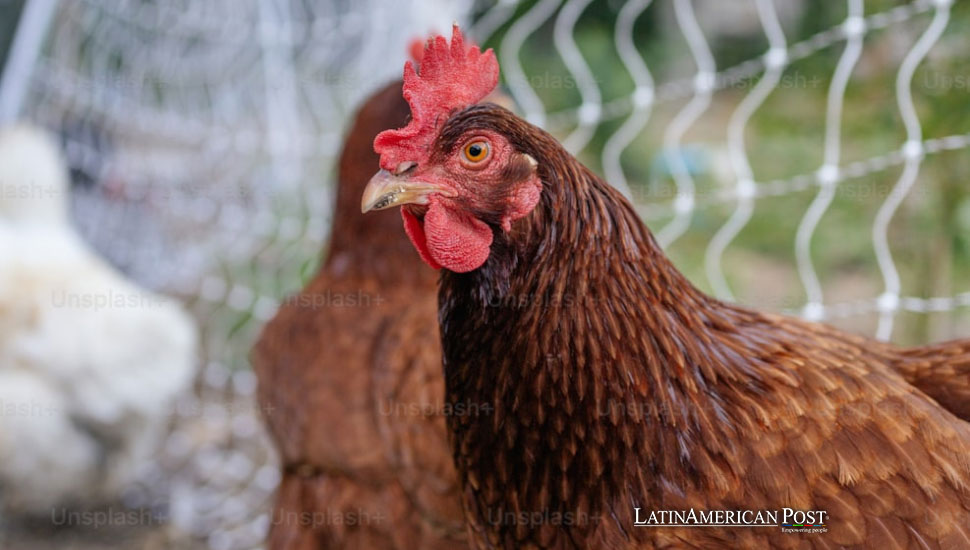Avian Flu Concerns in Intensive Farming: Latin America’s Biosecurity Challenges

Recent human cases of avian flu among U.S. farmworkers have sounded a clarion call, raising urgent concerns about the microbiological safety of intensive farming. A University of Exeter study, conducted with a sense of urgency, explores the overlooked social and economic factors with significant implications for Latin America.
Recent reports of human cases of avian flu among workers in intensive farming operations in the United States have sparked concerns about the microbiological safety of these facilities. Addressing these fears, the University of Exeter in the United Kingdom has published a study in the Royal Society Open Science journal. The study highlights social and economic factors often overlooked in traditional evaluations, with significant implications for Latin American countries deeply involved in intensive farming.
The findings of the University of Exeter study raise new concerns about the potential for avian flu to spread through various channels, including raw milk from infected cows. As researcher Steve Hinchliffe explains, the COVID-19 pandemic has renewed interest in zoonotic viruses, infectious diseases that jump from animals to humans. While the transmission of pathogens depends on various factors, microbiological, ecological, and veterinary characteristics have traditionally been considered the most influential.
With its vast and diverse agricultural sectors, Latin America is not immune to these challenges. Countries like Brazil, Argentina, and Mexico play significant roles in global food production, and the safety of their intensive farming practices is crucial. Intensive livestock farming is often safer than other animal husbandry because it separates livestock from wild animals that can be virus reservoirs, thereby eliminating the risk of species-jumping and transmission. However, Hinchliffe and his team argue that this view is biased because it needs to account for the real-world conditions of biosecurity on intensive farms. “Buildings and fences can suffer damage, wild animals like rats and birds can infiltrate, and workers move around. Accidents will always happen,” Hinchliffe notes.
The study also highlights the troubling potential for the H5N1 avian flu virus to be transmitted between mammals through milk and sometimes via the air. Authorities clarify that the risk to the general population remains low, but the findings underscore the need for robust biosecurity measures.
Social and Economic Factors in Latin American Biosecurity
Recognizing the biases in previous assessments, the Exeter team conducted a new analysis that included social, economic, and political factors, revealing a more concerning picture. Both livestock farming and agriculture alter the landscape and degrade the environment, leading to the emergence of new infectious diseases. Adhering to biosecurity standards is costly, and compliance is not uniform worldwide due to varying contexts.
Tailored solutions are necessary in Latin America, where diverse climates and economic conditions exist. For instance, in tropical regions, strategies must address biosecurity and animal overheating prevention. Similarly, in countries with older farming infrastructure, investments in modernization and maintenance are critical. “The result,” the authors note, “is an environment that is anything but biocontained.”
The study further points out that the ties between national authorities and food companies negatively impact the safety of intensive livestock farming due to the difficulty of “disassociating interests.” Co-author Kin Wing (Ray) Chan emphasizes, “Increasing biosecurity, standardization, and efficiency is not the solution for achieving a disease-free environment. We must reconsider the socio-cultural implications of intensifying farm animal production on planetary health, environmental sustainability, and animal welfare.”
The Global Implications and Latin America’s Role
The issues highlighted in the study have global implications. With Latin America’s extensive agricultural sectors, the region’s role in the spread of zoonotic diseases is under scrutiny. As Latin American countries increasingly engage in intensive farming to meet global food demands, understanding and mitigating the risks associated with these practices is crucial.
Countries like Brazil and Argentina, significant exporters of livestock and agricultural products, must ensure biosecurity in intensive farming to protect domestic and international health. The lessons from the University of Exeter’s study can be applied to improve practices in Latin America, ensuring that the region contributes to global food security without compromising health standards.
The inclusion of avian flu cases among human workers in intensive farms underscores the urgent need to reassess the safety of these facilities. The University of Exeter’s study highlights the importance of considering social, economic, and political factors in evaluating biosecurity risks. For Latin America, this means developing solutions that are tailored to the region’s unique farming practices and challenges.
Collaborative Efforts in Latin America
The journey towards safer and more sustainable intensive farming is not without its challenges, but it is a journey that promises significant change. Governments, industry stakeholders, researchers, and communities must work together to address the multifaceted challenges identified in the University of Exeter’s study. To be effective, policies and regulations must be informed by scientific evidence and adapted to local contexts.
Regional cooperation is not just a suggestion, it’s a necessity that can significantly enhance biosecurity standards in Latin America. Countries can share best practices, conduct joint research, and develop harmonized regulations to prevent the spread of zoonotic diseases. By working together, Latin American nations can strengthen their collective capacity to manage biosecurity risks and contribute to global health security.
The international community also has a role to play in supporting these efforts. Organizations such as the World Health Organization (WHO) and the Food and Agriculture Organization (FAO) can provide technical assistance, funding, and expertise to help countries implement effective biosecurity measures. Additionally, global partnerships and initiatives can facilitate knowledge exchange and innovation in intensive farming practices.
The inclusion of avian flu cases among human workers in intensive farms has underscored the urgent need to reassess the safety of these facilities. The University of Exeter’s study highlights the importance of considering social, economic, and political factors in evaluating biosecurity risks. For Latin America, this means developing context-specific solutions that address the unique challenges of the region’s farming practices.
Also read: Latin America Reels from Global Microsoft Outage Disruptions
As the world grapples with the ongoing threat of zoonotic diseases, collaborative efforts are essential for creating safer and more sustainable intensive farming systems. By integrating scientific knowledge, local expertise, and international cooperation, we can build a future where intensive farming contributes to global food security without compromising health standards.





